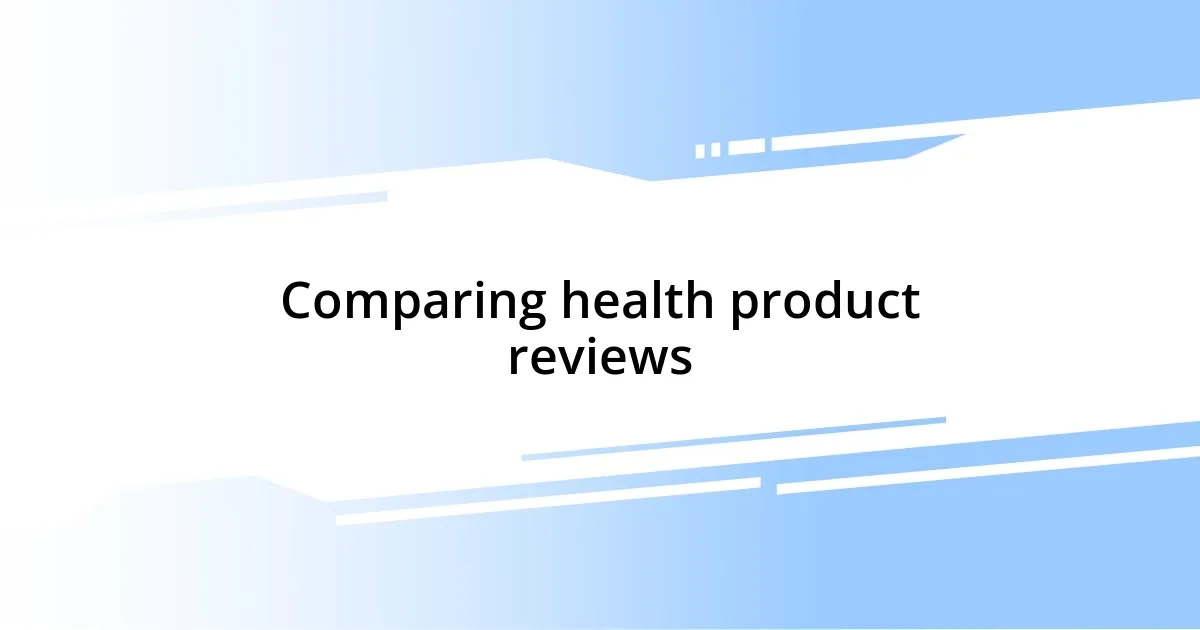Key takeaways:
- Identify personal health needs by reflecting on specific issues and considering scientific backing.
- Conduct thorough research on health brands, focusing on ingredient transparency and customer feedback.
- Evaluate product ingredients critically to understand their benefits and potential sensitivities.
- Track the effectiveness of products through personal journaling and community feedback to make informed decisions.

Understanding health product needs
Understanding health product needs can be quite personal. I remember when I first started exploring vitamins and supplements; I felt overwhelmed by the options on the shelves. It made me question, how do I choose what’s truly necessary for my well-being?
In my experience, identifying what health products actually align with your lifestyle is crucial. For instance, after struggling with fatigue, I realized I needed to focus on iron-rich supplements. This wasn’t just trial and error; it was about listening to my body’s signals and understanding that my dietary choices had direct effects on my energy levels.
It’s essential to ask yourself reflective questions, like: “What specific issues am I looking to address?” or “Am I relying on trends, or is there scientific backing for my choices?” Delving into these questions can illuminate the true needs behind the products we seek, helping us make informed decisions that resonate with our personal health journeys.

Researching trusted health brands
When researching trusted health brands, I found that personal recommendations often carried weight, but I didn’t stop there. I turned to online reviews and testimonials, looking for common themes. This deeper dive revealed patterns that informed my choices and gave me a sense of community among those facing similar health challenges.
- Look for brands with transparent ingredient sourcing.
- Check if the products are third-party tested for quality.
- Explore customer testimonials for real-life experiences.
- Investigate their customer service reputation; a responsive brand is often more trustworthy.
- Follow credible health blogs or forums to gather insights from other enthusiasts.
I vividly recall stumbling upon a brand that seemed too good to be true based on friends’ praise. However, digging deeper, I discovered their lack of transparent sourcing left me uneasy. This experience reinforced the importance of thorough research; a trusted brand balances quality, transparency, and community feedback.

Evaluating product ingredients and benefits
When evaluating product ingredients and benefits, I always lean towards transparency. A product might sound great, but if I can’t find out what’s inside, I feel hesitant. For example, I once tried a supplement that boasted a “proprietary blend,” but without clarity on the exact ingredients, I couldn’t truly assess its value. This taught me to dig deeper; understanding each component helps me gauge not just effectiveness but potential sensitivities as well.
I remember one incident where I switched to a new multivitamin promising enhanced absorption. Initially, I was excited, but after checking its ingredient list, I discovered it included additives I often react to. Not every ingredient might be a red flag for everyone, but based on my history, avoiding fillers became a priority. My experience emphasizes the necessity of assessing not just benefits but also how ingredients can impact my health uniquely.
It’s crucial to find credible sources that break down the benefits and potential drawbacks of various ingredients. A simple comparison can often illuminate choices that align with my health objectives. For instance, comparing vitamin D sources—sun-derived versus synthetically produced—showed me where I should place my trust. This way, I’m empowered to make decisions that best suit my individual health journey.
| Ingredient | Benefits |
|---|---|
| Vitamin C | Boosts immunity, antioxidant properties. |
| Omega-3 Fatty Acids | Supports heart health, reduces inflammation. |
| Probiotics | Enhances gut health, improves digestion. |

Comparing health product reviews
It’s fascinating how diving into health product reviews can be a bit like piecing together a puzzle. When I read through these reviews, I often evaluate not just the star ratings but the specifics people share. For instance, a glowing review on a protein powder called my attention, but when multiple users mentioned an upset stomach as a common experience, I paused. Those insights helped inform my decision, along with how well a product might fit into my routine.
Comparing reviews across multiple platforms has taught me about the nuances of health products. I remember once feeling overwhelmed by the conflicting information on a popular energy supplement. Some praised its benefits, while others criticized its taste and effectiveness. I decided to look for reviews that detailed people’s before-and-after experiences, which painted a more accurate picture for me. It’s those detailed accounts—where users share genuine transformations or struggles—that often resonate the most.
I also find value in how reviewers discuss customer service experiences. After reading about a brand known for having a supportive team, it gave me confidence in trying their new herbal tea blend. This isn’t just about the product; it’s about the community and support behind it. I often wonder—how many times have I hesitated to buy because of poor customer support experiences shared in reviews? That connection can truly influence purchasing decisions.

Identifying potential side effects
Identifying potential side effects is something I take quite seriously. I recall a time when I was eager to try a new herbal supplement, only to discover that it could interact with a medication I was taking. It felt like I dodged a bullet by researching potential side effects beforehand. This experience underscored the importance of being proactive rather than reactive when it comes to my health.
Sometimes, it’s easy to overlook the less discussed side effects of a product. For example, while looking into a popular energy booster, I read several reports about anxiety as a side effect. As someone prone to anxiety, this was a dealbreaker for me. I often think, how many people might be using a product without considering how it could affect them personally? Those insights are invaluable in shaping my choices.
In my journey, I’ve learned that herbal supplements and natural products often come with their own set of potential side effects that aren’t always listed up front. When a friend recommended an adaptogen blend, I discovered through subsequent research that it could cause digestive upset in some users. This knowledge prompted me to approach the product with caution. Have you ever hesitated after uncovering a potential issue? I know I have, and it’s moments like these that reinforce the importance of thorough research in making informed decisions.

Making informed purchase decisions
When it comes to making informed purchase decisions, I can’t stress enough the power of ingredient transparency. There was a time I found myself drawn to a trendy wellness product, only to discover that its ingredient list was loaded with fillers. It made me think: if the brand isn’t clear about what goes into their products, what else might they be hiding? This realization sparked my quest for brands that prioritize transparency, as it builds trust and confidence in what I’m putting into my body.
Another crucial aspect I consider is how well a product aligns with my personal health goals. I remember feeling excited about a new vitamin blend, but then I took a step back to evaluate whether it truly addressed my needs—like boosting my energy or supporting my immunity. It’s easy to get swept up in marketing hype, but asking myself, “Does this actually serve my body and lifestyle?” helps to filter out the noise. Have you ever bought something only to let it collect dust on a shelf? I certainly have, and it’s those moments that remind me of the importance of personal alignment in my purchasing choices.
Lastly, I genuinely believe that my experience is enhanced when I engage with communities discussing health products. I often find myself scrolling through forums or participating in online discussions, and hearing others’ firsthand experiences feels like sharing wisdom among friends. One day, a user shared about a multivitamin that caused her headaches, which made me reconsider a supplement I was about to order. It’s amazing how collective knowledge can shape our decisions—so why not tap into that resource? How many gems of information are just waiting in the comments section?

Tracking health product effectiveness
Tracking the effectiveness of health products is something I genuinely prioritize. I remember when I first tried a popular fish oil supplement; I decided to keep a simple journal to note any changes in my well-being. After a few weeks, I started to see improvements in my joint flexibility, which was fantastic. But if I hadn’t been tracking those subtle changes, I might have missed out on recognizing its benefits altogether.
I’ve also learned that relying solely on personal experience isn’t enough. While discussing health products with friends, I stumbled upon an online tracking app that lets users log their experiences and results. Seeing how others reported improvements—or setbacks—helped me gauge what products work best. It’s a reminder that community feedback can be just as valuable as our own observations. Have you ever thought about how your health journey could change by sharing your findings with others?
What stands out to me is the importance of consistent metrics. For instance, I often use a fitness tracker to monitor my energy levels alongside new supplements I try. This way, I can correlate my daily activity with the health products I’m taking. It’s fascinating to see patterns emerge, confirming that some products truly enhance my energy while others may not deliver as promised. Isn’t it intriguing how a bit of data can empower us to make informed health choices?














